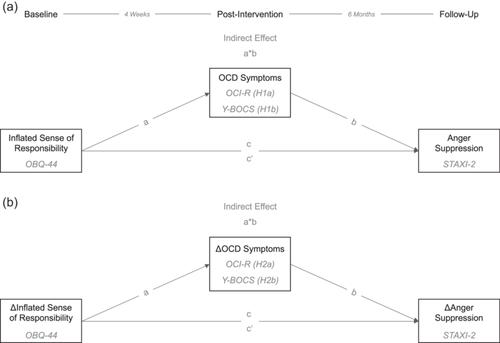Cognitive theories emphasize the central role of anger and anger suppression in obsessive–compulsive disorder (OCD). According to these theories, anger suppression is seen as a consequence of OCD, whereas cognitive beliefs, such as an inflated sense of responsibility, are seen as antecedent factors. To extend the findings from cross-sectional studies, the current study investigated the temporal associations between OCD symptoms, an inflated sense of responsibility, and anger suppression. Consistent with cognitive considerations, we hypothesized that OCD symptoms mediate the association between feelings of responsibility and anger suppression. These associations were also explored in patients presenting particularly high checking-related symptoms. Further, the stability of effects beyond controlling for depressive symptoms and medication intake was explored.
A total of N = 48 patients with OCD (50% female, M = 32.46 [SD = 10.63] years of age) completed measures on obsessive beliefs, OCD symptoms, and anger suppression at three assessment points: before and after a metacognitive intervention as well as at a follow-up 6 months later. Mediation models investigating symptom associations at these three timepoints were conducted. Exploratory analyses investigating these associations in individuals presenting high checking-related symptoms (n = 20) and testing the stability of effects beyond controlling for depressive symptoms and medication intake were conducted.
The sense of responsibility did not significantly predict the level of anger suppression. A temporal association between OCD symptoms (as assessed with the self-report measure) and anger suppression could be evidenced, which was stable beyond controlling for depressive symptoms and medication intake. Against the expectations based on cognitive theories, the sense of responsibility did not predict OCD symptoms. No mediating effect of OCD symptoms was found.
In line with cognitive viewpoints, the present study shows that higher OCD symptoms predict higher levels of anger suppression in a longitudinal design, thereby contributing to the suppression of anger. This effect seems to be independent from depressive symptoms and medication intake. The effect of sense of responsibility on OCD symptoms was less clear and could only be found in the subgroup of patients with OCD and checking-related symptoms, who generally presented higher levels of responsibility. Overall, this is the first study demonstrating temporal associations between OCD symptoms and anger suppression. Acknowledging that anger and anger suppression may be a consequence of OCD symptoms and may also affect aspects of psychotherapy, which can ultimately inform future adjustments to psychotherapeutic treatment.



